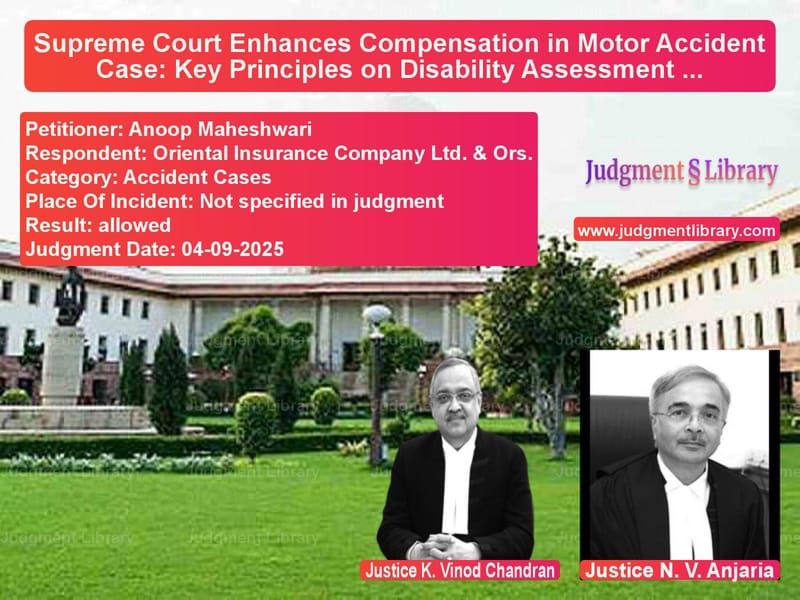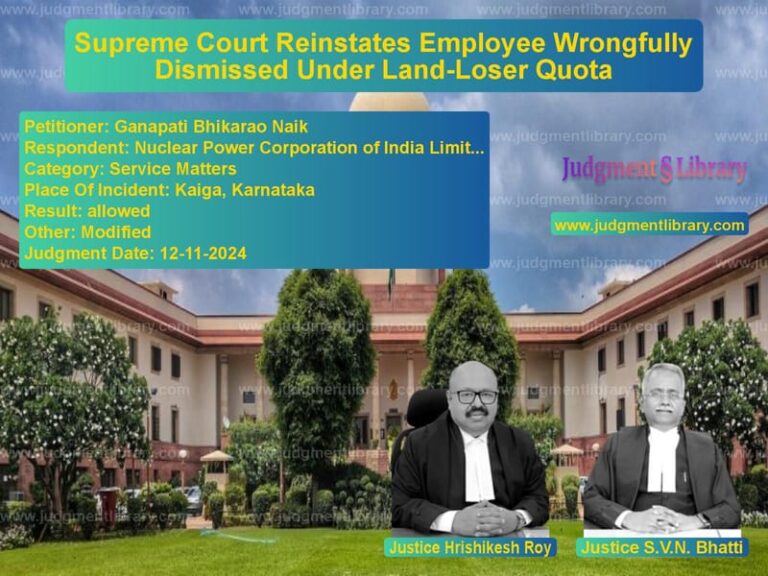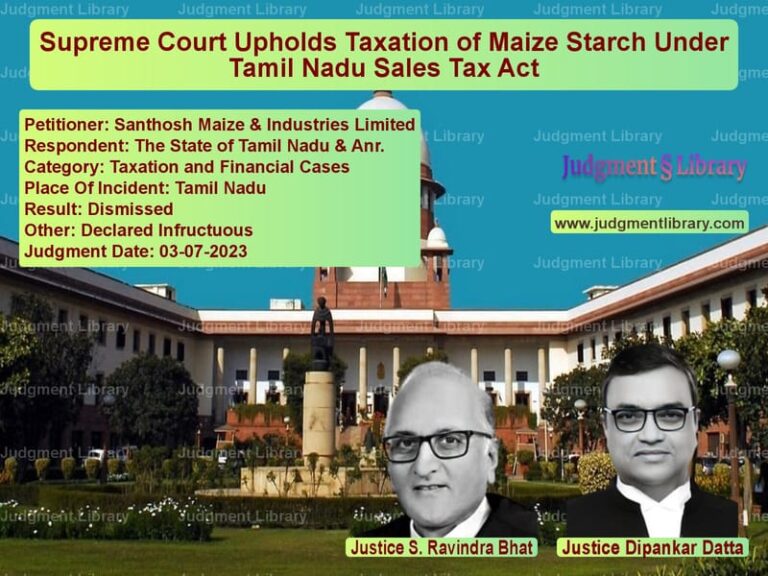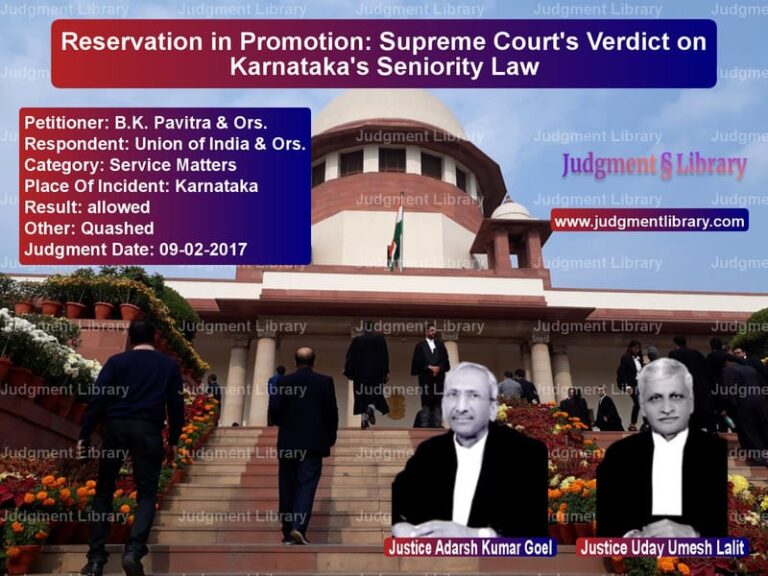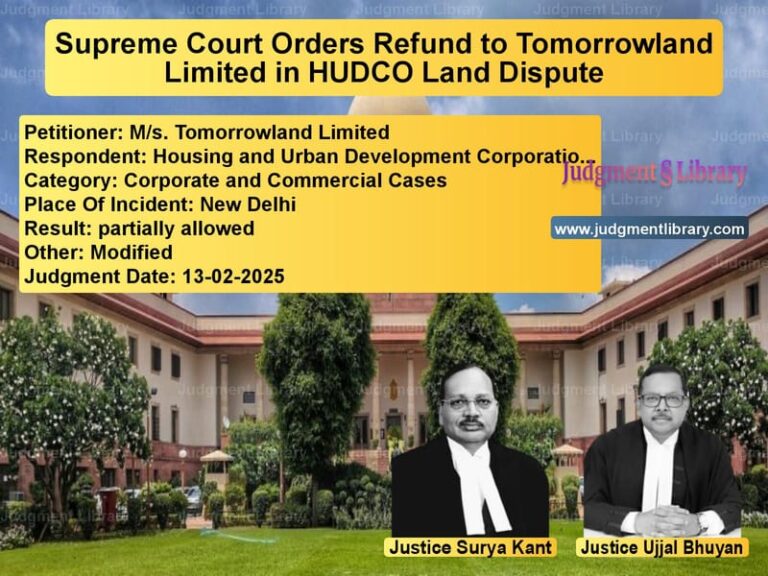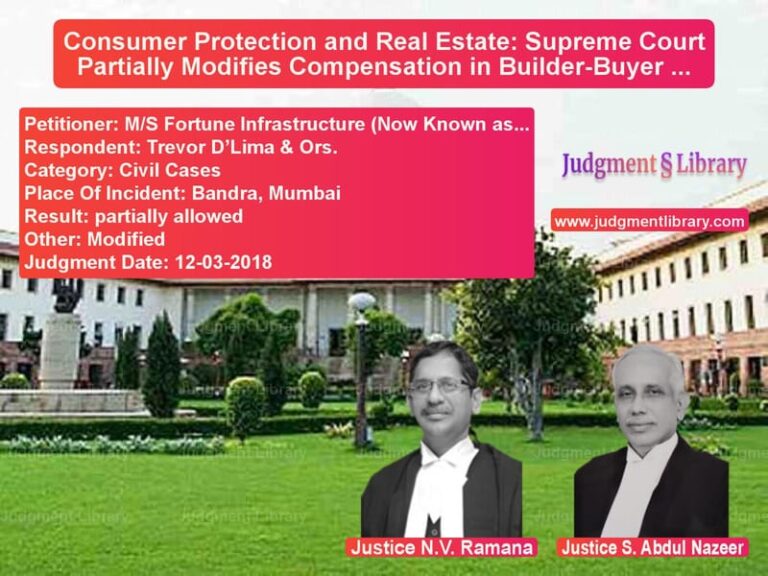Supreme Court Enhances Compensation in Motor Accident Case: Key Principles on Disability Assessment and Income Proof
In a significant judgment that clarifies crucial principles governing motor accident compensation claims, the Supreme Court of India recently enhanced the compensation awarded to a victim who suffered severe leg amputation in a road accident. The case involved important questions about disability assessment, income proof through tax returns, and future medical expenses for prosthetic limbs, setting important precedents for similar cases across the country.
The legal battle began with a tragic accident on April 9, 2007, when Anoop Maheshwari, riding his motorbike with a pillion rider, was hit by a rashly and negligently driven truck. The accident resulted in severe injuries to Maheshwari, leading to hemipelvectomy – the amputation of one leg along with a portion of the pelvic bone on the same side. The Motor Accident Claims Tribunal had initially awarded Rs. 13,23,831 as compensation, which was later enhanced to Rs. 23,09,600 by the High Court. Still dissatisfied, the claimant approached the Supreme Court seeking further enhancement.
The Disability Assessment Controversy
One of the central disputes in the case revolved around the assessment of disability. The claimant had produced a disability certificate from the Medical Board indicating 90% disability, based on the amputation at hip level. However, both the Tribunal and High Court had significantly reduced this percentage.
Mr. G.V. Rao, learned Senior Counsel appearing for the claimant, argued vigorously that “even going by the Employees’ Compensation Act, the amputation of leg at the hip brings in 90% disability which is evidenced further by the disability certificate issued by the Medical Board. There was no reason for the Tribunal or the High Court to go behind the medical certificate issued by experts and reduce the disability to 45% and 50%.”
The Supreme Court, however, made a crucial distinction between medical disability and functional disability. The Court observed that “The disability to be assessed for the purpose of awarding compensation arising from a motor accident is the functional disability which reduces the earning capacity of the claimant and not strictly the medical disability.” Considering that the claimant had been fitted with a prosthetic limb and could continue his business, the Court upheld the High Court’s assessment of 50% functional disability as reasonable for computing loss of income.
The Income Proof Debate
Another major contention involved the claimant’s income assessment. The Tribunal had completely rejected the income tax returns filed by the claimant for the years 2005-2006, 2006-2007 and 2007-2008, adopting a nominal income of Rs. 4,500 per month instead. The High Court enhanced this to Rs. 8,000 per month but still did not accept the income tax returns at face value.
The Supreme Court strongly criticized the Tribunal’s approach, stating that “we agree with the High Court that the Tribunal had entered into mere surmises and conjectures to decline adoption of the income as per the income tax returns.” The Court logically reasoned that “It cannot be said that the claimant apprehended an accident and got registration of a firm and filed his income tax returns two years prior to the accident.”
After examining the evidence, the Court accepted the income tax return for the financial year 2007-2008, which showed gross income of Rs. 1,96,000. After deducting tax of Rs. 4,641, the Court assessed the annual income at Rs. 1,91,000, significantly higher than what had been considered by the lower courts.
Future Prospects and Medical Expenses
The Supreme Court made important observations about future prospects in cases involving disability. While the High Court had added 40% for future prospects, the Supreme Court disagreed, noting that “the claimant though has suffered a disability, which has been determined to be 50%, there is no difficulty in continuing with the business and the claimant has also been fitted with a prosthetic leg which ensures his mobility and continuance of the business.”
Regarding medical expenses, the Court took a claimant-friendly approach. The Tribunal had awarded only Rs. 3,39,926 out of the claimed Rs. 12,54,985 for medical expenses, while the High Court enhanced it to Rs. 8 lakhs without detailed reasoning. The Supreme Court, however, directed payment of the entire claimed amount of Rs. 12,54,985, noting that “There is nothing produced on record also to indicate such verification having been conducted validly on the orders of the Tribunal.”
Future Medical Needs and Prosthetic Limb
One of the most significant aspects of the judgment was the Court’s recognition of the ongoing needs of accident victims requiring prosthetic limbs. The claimant had argued for future medical expenses, particularly for the periodic replacement and servicing of his prosthetic leg.
Read also: https://judgmentlibrary.com/supreme-court-enhances-compensation-for-100-disabled-accident-victim/
The Court acknowledged this practical concern, stating that “it is a fact that the claimant would require servicing and replacement of the accessories of the prosthetic limb periodically.” While noting that proper evidence wasn’t led regarding the frequency and cost of these future needs, the Court exercised its discretion to award Rs. 10 lakhs for future medical expenses and servicing of the prosthetic limb, observing that “Considering that the Tribunal had initially, on the basis of two vouchers, awarded an amount of Rs.4,70,805/-, for purchase and fitment of prosthetic leg, we are of the opinion that an amount of Rs.10 lakh would suffice to account for the future expenses for continued use of the prosthetic limb.”
Final Compensation Award
The Supreme Court’s comprehensive assessment resulted in a significant enhancement of compensation. The final award was structured as follows: Loss of income (Rs. 1,91,000 x 18 multiplier x 50% disability) – Rs. 17,19,000; Medical expenses – Rs. 12,54,985; Pain and suffering – Rs. 1,00,000; Loss of amenities – Rs. 2,00,000; Attendant expenses – Rs. 1,00,000; Expenses for artificial limb – Rs. 4,70,805; and Future medical expenses – Rs. 10,00,000. The total compensation awarded was Rs. 48,44,790 with 6% interest from the date of application.
Broader Implications
This judgment establishes several important principles for motor accident compensation cases. First, it reinforces that income tax returns cannot be rejected based on mere surmises and conjectures, especially when filed well before the accident. Second, it clarifies the distinction between medical disability and functional disability for compensation purposes. Third, it recognizes the practical reality that victims requiring prosthetic limbs need compensation not just for immediate costs but for future maintenance and replacement as well.
The judgment also demonstrates the Supreme Court’s commitment to ensuring “just compensation” for accident victims, balancing legal principles with practical realities. By considering the long-term needs of the claimant and rejecting technical objections to genuine claims, the Court has set a humane precedent that prioritizes substantive justice over procedural technicalities.
This ruling will serve as an important guide for lower courts and tribunals dealing with similar cases, particularly those involving permanent disabilities and ongoing medical needs. It emphasizes that compensation should truly compensate victims for their losses and ensure they can maintain a reasonable quality of life despite their disabilities.
Petitioner Name: Anoop Maheshwari.Respondent Name: Oriental Insurance Company Ltd. & Ors..Judgment By: Justice K. Vinod Chandran, Justice N. V. Anjaria.Place Of Incident: Not specified in judgment.Judgment Date: 04-09-2025.Result: allowed.
Don’t miss out on the full details! Download the complete judgment in PDF format below and gain valuable insights instantly!
Download Judgment: anoop-maheshwari-vs-oriental-insurance-c-supreme-court-of-india-judgment-dated-04-09-2025.pdf
Directly Download Judgment: Directly download this Judgment
See all petitions in Road Accident Cases
See all petitions in Compensation Disputes
See all petitions in Motor Vehicle Act
See all petitions in Negligence Claims
See all petitions in Insurance Settlements
See all petitions in Judgment by K. Vinod Chandran
See all petitions in Judgment by N.V. Anjaria
See all petitions in allowed
See all petitions in supreme court of India judgments September 2025
See all petitions in 2025 judgments
See all posts in Accident Cases Category
See all allowed petitions in Accident Cases Category
See all Dismissed petitions in Accident Cases Category
See all partially allowed petitions in Accident Cases Category

